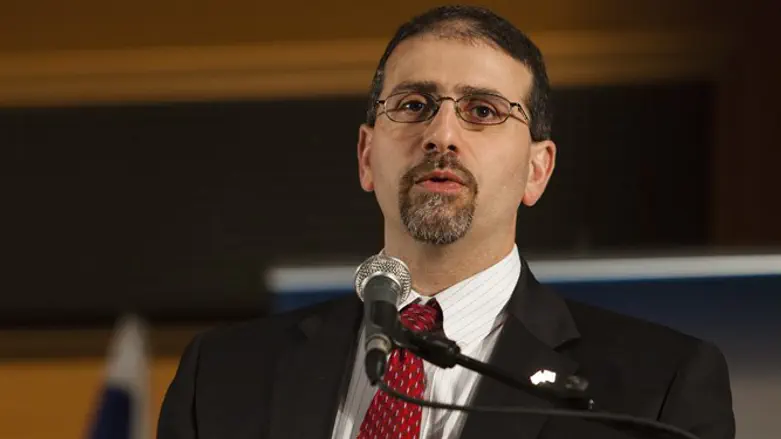
Former U.S. Ambassador to Israel Dan Shapiro on Saturday took a surprising stance about the relocation of the U.S. Embassy in Israel to Jerusalem, which is scheduled for Monday, writing in an essay on CNN.com that the move could actually help advance an end to the Israel-Arab conflict.
“I will take a contrarian view: the move of the U.S. Embassy to Jerusalem can actually help advance an end to the conflict,” wrote Shapiro, who served as Ambassador to Israel under President Barack Obama.
He went on to write that the United States had never recognized Jerusalem as Israel's capital, until President Donald Trump did so last December, because when the United Nations passed the Partition Plan for Palestine in November 1947, in punted on Jerusalem, due to its sensitivity.
“The issue was too hard to settle, so virtually every country put off making any changes to its policy until Jerusalem's status could be resolved through negotiations. The U.S. was among them,” wrote Shapiro.
“That situation remained unchanged through multiple peace initiatives over many decades. It did not change in 1967 when Israel unified the city, and despite Israeli claims that an undivided Jerusalem will always be Israel's. And it did not change — in fact, it was reinforced — in 1993 when the Oslo Accords were signed and Israel and the Palestinians agreed that Jerusalem would be put on the table as an issue to be addressed in final status negotiations.”
“When the U.S. Congress, in 1995, advanced legislation that would require the move of the American Embassy to Jerusalem, the Clinton Administration sought a waiver authority, allowing the President to delay the move by six months at a time.”
“That led to regular delays, enacted by Presidents Bill Clinton, George W. Bush, Barack Obama and Donald Trump to avoid igniting perhaps the most sensitive issue in the conflict, likely dooming the chances for productive negotiations,” continued Shapiro.
He pointed out that “Jerusalem had always been Israel's capital, and we have always treated it functionally, if not formally, as such. When I served as the U.S. Ambassador at our embassy in Tel Aviv, nearly every day I would be driven to Jerusalem to conduct affairs of state with the Israeli government at the Prime Minister's office, the Foreign Ministry, and the Knesset.”
“So when President Trump announced that the embassy would be relocated, he was -- as he put it -- recognizing a reality, and, in a sense, correcting a long-held historical anachronism,” wrote Shapiro.
He claimed that moving the American Embassy to Jerusalem “will help strengthen the principle that Israel's claim to the city, born of centuries of Jewish connection to the city, is legitimate and must be recognized. It probably should have been long ago.”
“What will help complete the picture is similar clarity by the U.S. that the Palestinians, with their own historical and religious ties, have a valid claim to East Jerusalem,” opined the former Ambassador.
“Trump has signaled this step by saying that, despite U.S. recognition, the boundaries of Israeli sovereignty will only be determined in negotiations. No doubt, that will include Israel retaining control over key holy sites, like the Western Wall, and creative arrangements elsewhere.”
“But East Jerusalem has many Arab neighborhoods where few Israelis enter, and a negotiated boundary to include a sovereign Palestinian capital in a unified city -- as part of a broader agreement -- is both reasonable and doable,” opined Shapiro.
While the Israel-Arab conflict is not anywhere close to a resolution, he wrote that “I am optimistic that the overdue step of locating the U.S. Embassy in Jerusalem can actually bring closer the day when the issue long deemed the hardest in the conflict to solve may in fact become the most obvious. And that would only advance the cause of achieving a conflict-ending deal.”
The new U.S. Embassy in Jerusalem is set to be inaugurated on Monday. On Friday, Ambassador David Friedman posted a video showing the preparations for the inauguration of the Embassy and said, "We are almost ready to open the beautiful new embassy in Jerusalem, Israel. We’re so excited.”
"The embassy staff is working around the clock to get ready. We’re anticipating a beautiful, inspirational, moving event. As they say in the Passover Haggadah: 'Next year in Jerusalem.' This year, thanks to the U.S. administration, the courage and the vision of President Donald Trump, we can say, 'This year in Jerusalem,'" added Friedman.
On Thursday, Trump spoke at a rally in Indiana and received a loud round of applause from the crowd when he said, "Next week, we will finally open the American embassy in Jerusalem."
Trump recalled that, after he recognized Jerusalem as Israel’s capital, he asked how long it would take to build a new building for the embassy.
“They said anywhere from five to ten years. So I said ‘unless they give me an extension for the presidency', which I don’t think the fake news media would be too happy about,” said the President, adding, “Wait, wait …actually, they would be happy, because when I’m not here, their ratings are going to sink, so they’ll probably be very happy.”
“So they said from five to 10 years, that means probably 15 to 20 years right? So we open the embassy next week, three months, three months,” stated Trump, who will deliver a video address for the opening of the new embassy from Washington.